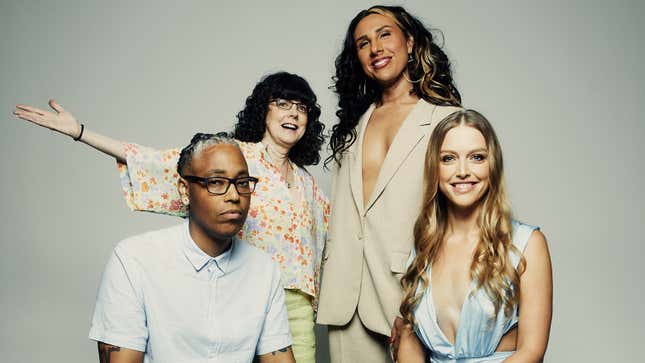‘Every Body’ Doc Shines Light on Horrific Surgical Interventions on Intersex Children
“Intersex children get surgeries that they don’t want, and trans people have to fight for surgeries that they do want.”
EntertainmentMovies

A notorious medical case led director Julie Cohen (RBG) down the path to making her new documentary about the battle for intersex rights, Every Body, which premiered Sunday at the Tribeca Film Festival and opens in theaters June 30. Cohen, a former Dateline producer, was given access to NBC archives to sniff out potential topics for documentaries, and in the process came upon the story of David Reimer. After a botched circumcision that burned his penis beyond ostensible repair as a baby, Reimer’s parents took him to see John Money, a psychologist/sexologist, who recommended sex reassignment surgery. Reimer was raised as “Brenda” and continued to be treated by Money, alongside his identical twin brother, Brian. David Reimer proved a fascinating case study for Money, regarding nature and nurture.
However, the results of his experiment were disastrous (and, according to Brian, involved sexual abuse), leading David Reimer to lash out and experience suicidal depression. He finally found out at age 14 the truth about the surgical intervention foisted upon him and resolved to live the rest of his life as David. For the rest of his life, Reimer struggled and eventually died by suicide in 2004 at age 38.
Money’s model was, at the time (and in many places it remains), standard treatment for intersex babies—that is, children born with both male and female sex characteristics. Among intersex people, there is a push back against these interventions that they had no say in (and that their parents in some cases have been pressured into). And so, about four years ago, Cohen started researching the intersex rights movement. Her reaction, as she shared in a Zoom conversation with Jezebel earlier this week, was: “Wow, this is amazing. How come nobody’s talking about this? Why don’t I see it more on the news?”
Cohen made Every Body to shine more of a spotlight on the movement with a rather straightforward objective: “to tell a story in a way that’s going to really draw someone in, will give people some new information, and just be digestible.” Within the context of the greater movement, Cohen’s film tells the stories of three intersex activists: political consultant Alicia Roth Weigel, Ph.D. student Sean Saifa Wall, and actor/screenwriter River Gallo. They are unflinchingly honest about their bodies (“I was born with balls!,” in addition to a vagina, says Weigel, who identifies as female). Cohen said she intentionally selected subjects who already had a degree of comfort speaking on camera. “I only want to make films about people who want to have films made about them,” explained the director.
Weigel, who came out as intersex in front of the Texas legislature in response to a proposed anti-trans bathroom bill, said she entered Every Body with some trepidation, having previously bowed out of a different intersex project, which “felt very exploitative.”“I think as intersex people, we are used to being exploited,” Weigel explained in a separate Zoom with her fellow subjects. “And yet with Julie, it felt very different from the get go.” Weigel said the director proved early on that she believed her subjects and was legitimately interested in their cause.
Cohen chalked up her success in winning the trust of her subjects to just listening to them. Do so for a few minutes and you’ll get a sense of their urgency.
“We’ve been seen as a fringe movement for far too long,” said Weigel. “We’re actually two percent of the world’s population. That’s 150 million people around the world. That’s half the population of the United States. So we’re not actually a fringe movement. We’re just an underrepresented movement.”
“Intersex people being erased from social consciousness, this has been a project that’s been ongoing for like hundreds of years,” added Wall. “I think what this documentary does, what our activism does, it actually reclaims our place.”
-

-

-

-

-

-

-

-

-

-

-

-

-

-

-

-

-

-

-

-

-

-

-

-

-

-

-

-

-

-

-

-

-

-

-

-

-

-

-

-








































